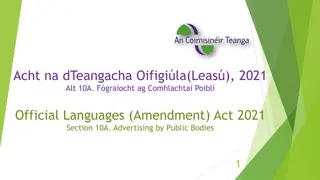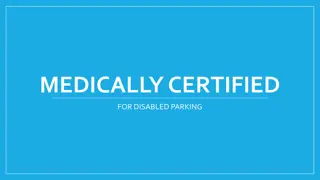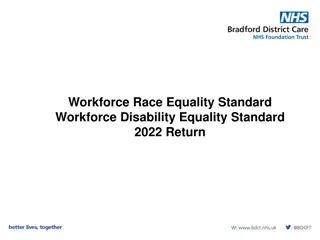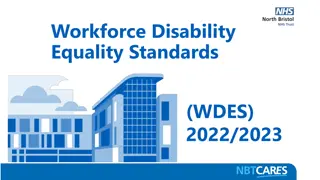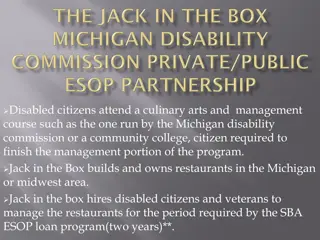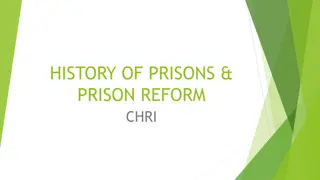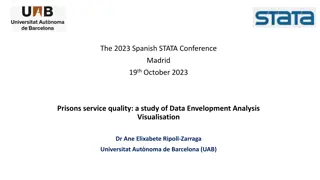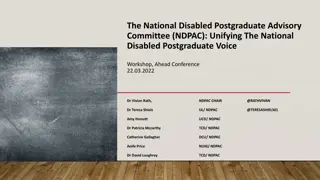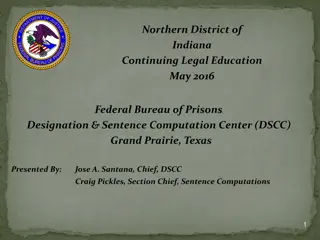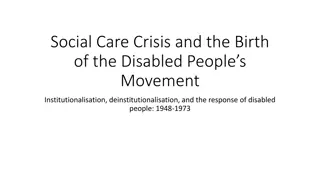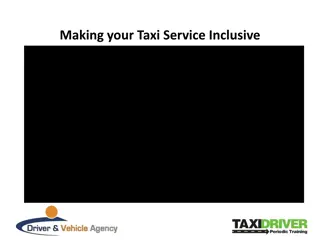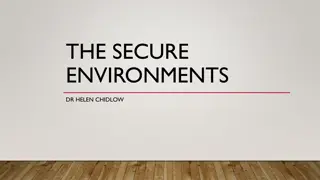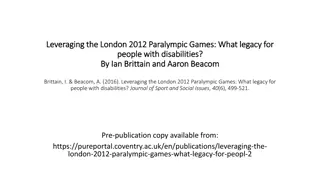Protecting the Rights of Disabled Individuals in Irish Prisons
Exploring the challenges and rights of disabled individuals in Irish prisons through a human rights framework. The discussion covers the definition of disability, international instruments protecting disabled prisoners, and specific cases addressing disability rights in prison settings.
Download Presentation

Please find below an Image/Link to download the presentation.
The content on the website is provided AS IS for your information and personal use only. It may not be sold, licensed, or shared on other websites without obtaining consent from the author.If you encounter any issues during the download, it is possible that the publisher has removed the file from their server.
You are allowed to download the files provided on this website for personal or commercial use, subject to the condition that they are used lawfully. All files are the property of their respective owners.
The content on the website is provided AS IS for your information and personal use only. It may not be sold, licensed, or shared on other websites without obtaining consent from the author.
E N D
Presentation Transcript
The Rights of Disabled People in Irish Prisons The Rights of Disabled People in Irish Prisons
Who are disabled people in prison? Who are disabled people in prison? Human rights conception of disability Persons with disabilities include those who have long- term physical, mental, intellectual or sensory impairments which in interaction with various barriers may hinder their full and effective participation in society on an equal basis with others. - Article 1, Convention on the Rights of Persons with Disabilities
Human Rights Framework Human Rights Framework Several general human rights instruments - UDHR, ECHR, ICCPR, CAT Prisoners Rights Framework Mandela Rules Disability Rights Framework - Convention on the Rights of Persons with Disabilities Equality and Non-Discrimination Accessibility Reasonable Accommodation
Human Rights Framework (continued) Human Rights Framework (continued) ECHR Several cases addressing the rights of prisoners with disabilities (Article 3) Semikhvostov v Russia - violation of article 3 of the European Convention on Human Rights (prohibition of torture) due to the lack of accessibility for a disabled prisoner Price v UK - inaccessible cell and restroom amounted to degrading treatment D.G. v Poland - man had to rely on his fellow inmates for mobility and sanitation Other institutional settings forensic psychiatric settings, residential services
Irish Prisons Irish Prisons Prison Population: 4,384 mainly sort term <1 year Governed by the Prison Act 2007 which gives effect to the SI Prisons Rules 2007 Broadly rooted in the Mandela Standards Rules foresee transfer to specific facilities for disabled people I think one of the big issues with prison is if you don t fall within the norm of being an 18-30-year-old, able-bodied male - and even using that term itself I know is not ideal. But if you don t fit within that sort of norm, prison is going to be a challenge for you.
Project Structure Project Structure Three researchers on the Project Advisory board of Five DPOS: VVI, NPSA, ILMI, RE and NPSA Commissioned by the IPRT and funded by IHREC Interviewed 31 people o 16 Disabled People in Prison o 4 prison staff o 3 Disability rights advocates o 1 Penal reform advocate o 7 Stakeholders across the criminal justice system
Physical Environment Physical Environment Physical environment an issue across impairment types Barriers in terms of the sensory accessibility of prisons Noise Lights Chemical smell Time Both at risk of over and under stimulation When they slam that door at 7 o clock, that is it, you are in there until there until the next morning.
Access to Information Access to Information Huge amount of information not written down Written in plain language No easy to read available I try and make my own meaning up of it. To be honest with you I was too embarrassed to ask anyone else. Do you know, for my situation, I left school at an early age and I never got to learn how to read and write in school.
Communication Access Communication Access No understanding of different forms of communication Created barriers Exasperated tensions My short-term memory is shot. You see the way I m speaking to you now and telling something, a lot of things I said, it would be in my head somewhere but it would come back to me. And that s a big problem when I m especially talking to, as I call them, the screws. I keep falling out with them because they tell me to do, I keep forgetting to do things, you know, but they don t understand the problem I have because - they re all just the same to them, they re in prison.
Communication Communication It could be communication issues that aren t fully, I suppose, addressed that could end up with a frustrating situation for both prisoner and Prisoner Officers that, and sometimes you know it can be an aggressive outburst, purely down to the frustration of the prisoner concerned not being able to communicate appropriately - Public Servant
Understanding of rights Understanding of rights Minimal understanding of rights Confusion of rights v regime It does a bit; it goes on about rules and regulations on that book but it doesn t give your rights. I've a little book about that size but it doesn t say your rights in it it s hard to understand it.
Rules, Rules, Dicipline Dicipline, Regime Confusion around the Rules: I didn t get any rule book, I didn t get nothing really like you know what I mean? At the start there was no one telling me anything, the prisoners were telling me what I was entitled to, what I wasn t entitled to. Even as an ordinary just, coming in as a prisoner without a disability I found it very hard to find out what way the regime was. You just learn them as you go along. You get an IR [disciplinary action] , Regime
Regime Regime Incentivised Regime Three levels Basic, Standard and Enhanced Each have different privileges related to gratuity, communication and visits Entitlements and treatment based on regime Significant confusion around how to navigate the regime: it is very hard to get enhanced [you have to] do the gym every single day like, for eight weeks. Or else you can do the school. You have to [do] five subjects in the school to get enhanced like.
Regime (continued) Regime (continued) Prisoners with disabilities struggled to navigate the regime: So, I m just finding it very hard to get off basic. I am getting some acceptable weeks and some unacceptable weeks. Prisoners also inadvertently penalised for not engaging with services that weren t directly: I haven t been in any trouble and that s all been written down. I haven t been in any trouble and like if you have good behaviours, you re supposed to be transferred
Non discrimination in Prison Services Non discrimination in Prison Services Direct and indirect discrimination in accessing prison services such as education: Some teachers have no tolerance at all Some teachers are not so good with that kind of [invisible] disability The teacher wouldn t have the time to come and sit down [with a prisoner with disabilities]
Access to employment in a prison setting: Access to employment in a prison setting: No, no. I m waiting but I haven t heard anything, like. I ve had good behaviour, like. Am I asking like can I get a job and the guards are like oh wait, oh yeah, we will let you know, we ll let you know, wait, wait, wait. And then there s some list and your name is on the list, whatever, but it s no good, like. do you know what I mean, and you get a job.
Support Support Reliant on other prisoners for support in many cases: It s funny and people in the community mightn t see it but you'd see a Prison Officer and a prisoner working together. Like they might say, Like [name], come on, come on, come on , and the Officer might be saying, [name] you have to go in , and he'd be talking to him this way and then his cell mate would bring him in, he'd be coaxing him in.
Diversion Diversion Particularly a concern from stakeholders Prison staff expressed tensions that it wasn t carried out more: I would prefer prison myself than that system. I d probably prefer prison, to be honest, to Dundrum. Not compliant with the Convention on the Rights of Persons with Disabilities. Risk of having a sentence extended through wardship and the Mental Health Act.
Transition from Prison Transition from Prison Concern of prisoners with disabilities not getting parole, step down services, community and temporary release: I can t go to an open jail because there s no medical team there 24 hours a day. There are other fellas getting schemes, they re getting on this, they re doing, you know what I mean? I mean, like why am I being, why am I still here when I have the same charge as them?
Transition from Prison (continued) Transition from Prison (continued) Pre and post release support identified as a concern amongst prisoners I could do with some person to help me yeah, just have a course or scheme or a job or something else like because like I ll be going from structure into no structure again. And that s how I've reoffended you know. Having no structure. I had something lined up, I wouldn t be as worried getting out, lined up for when I get out I wouldn t be as worried. Being honest with you I'd say before I get out, I'll be stressed out because I've been in here so long. It'll be different. If I got into normal jail or something and I started getting weekends I would get used to... like when I'm getting out, I don't even know if I want to get out because I've been in that long, even though I have a family and all out there. But I've been in prison so long.
Conclusion Conclusion Disabled prisoners were disadvantaged at every point in prisoner life Prison staff reliant on own knowledge - subject to their own biases. More research needs to be done on the extent of the rights violations experienced Room for reform at every level training, regime, services and environment



